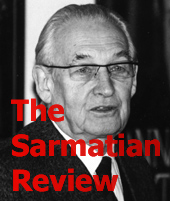| This Issue | Back Issues | Editorial Board | Contact Information |

From the Editor
April 2003
Volume XXIII, No. 2
This issue begins with an article on the Polish minority in Hamburg. Dr. Eder highlights the near-invisibility of Polish immigrants to Germany. While many immigrants aspired to the status of Aussiedler (i.e., they claimed to be of German ancestry), they have generally brought with them the Polish language, customs, and religious beliefs. As SR editors noted on visits to cities such as Bremen and Dresden, virtually the only people who attend Catholic masses there are Poles, and the masses are often in Polish. As Dr. Eder points out, there is "Polish life" in Hamburg, but very little of it reaches German public life. Is this related to what Andrzej Wajda said in his interview, that Poles are accustomed to belittling themselves? Poland's membership in the European Union should facilitate discussions of these issues and eventually bring about a correction.
The interview with Andrzej Wajda brings in some noteworthy revelations from the famous film maker. Aleksandra Ziólkowska-Boehm is a talented interviewer who teases out of her interviewees information that might otherwise have remained unpublished. Rather than summarizing Wajda's sage remarks, we urge readers to savor the interview in its entirety. The interview has not been published before in either Polish or English.
In his review, Dariusz Skórczewski writes about Poland's finest literary scholar, Professor Ryszard Nycz of Jagiellonian University, editor of Teksty Drugie, Poland's best journal of literary criticism and theory. Nycz's interpretations of Polish writers are original and sophisticated, and Dr. Skórczewski skillfully highlights them in his assessment of Nycz's book.
Recent political developments account for the subject of Our Take. The political repositioning of East Central Europe is one of the international events that attracted little attention of America's political pundits, yet it may have momentous consequences. Surprised by the reshuffling, France suggested that countries east of the Oder River sit quietly and wait for cues from France and Germany, in alliance with Russia, on how to behave. But the Central Europeans know from history that such an alliance has generally been strongly disadvantageous to them. They know that it is crucial to the welfare of the newly independent states in Eastern and Central Europe to keep the United States as a player in Europe.
Finally, after Steven Kaminski's poem that delicately invokes an unforgettable element of Polish historical memory, we publish the penultimate installment of Zofia Ptasnik's Diary. Readers may have grown tired of this book-size Diary that has been appearing in SR for over a year now. Yet each installment brings in new elements of this "remembered life" that we wish to honor.
Back to the April 2003 Issue
The Sarmatian Review
sarmatia@rice.edu
Last updated 4/10/03